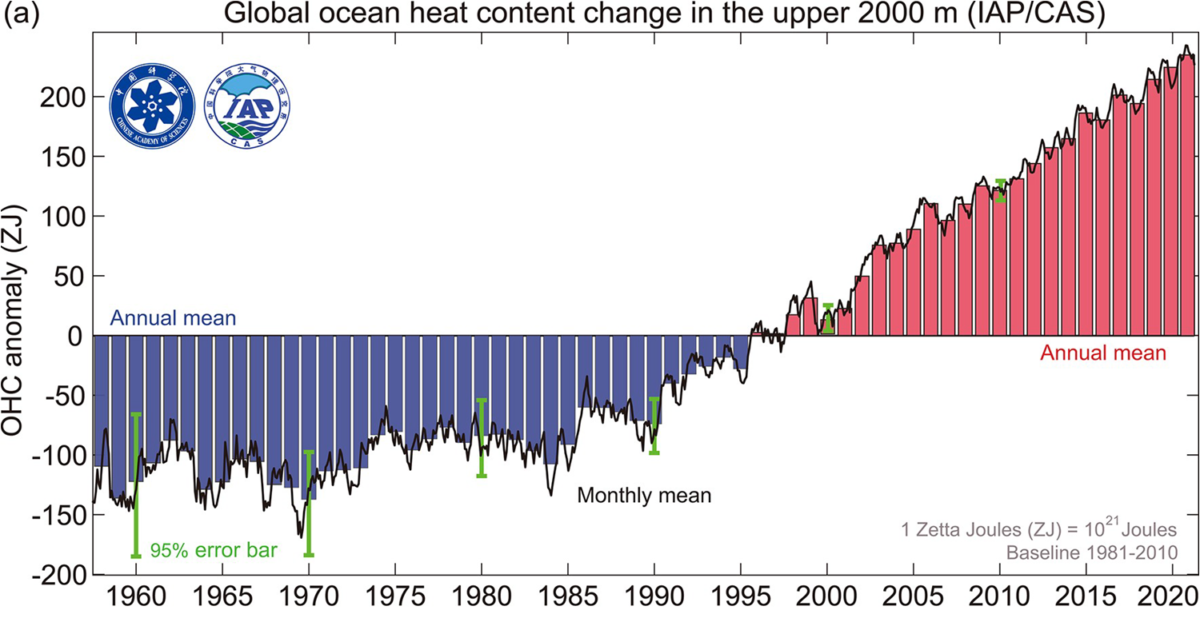2021 wasn’t hottest year, but oceans are hottest ever

As the world warms, oceans store an ever more solar energy to increase global ocean heating and polar ice melting.
As the following article explains, thanks to the continuing rise in the greenhouse effect caused by the continuing rise in concentrations of CO₂ and methane, our planet continues to capture more solar heat that it can radiate away to space. Some of this excess increases air temperatures. However, most of the excess solar energy goes into ocean heating. Hot oceans heat Earth. The warmer water can melt polar ice covers and heat can be stored for slow release into the terrestrial environment and atmosphere over many years.

Another Record: Ocean Warming Continues through 2021 despite La Niña Conditions
by Lijing, et al., 11/01/2022 in
Advances in Atmospheric Sciences
Abstract: The increased concentration of greenhouse gases in the atmosphere from human activities traps heat within the climate system and increases ocean heat content (OHC). Here, we provide the first analysis of recent OHC changes through 2021 from two international groups. The world ocean, in 2021, was the hottest ever recorded by humans, and the 2021 annual OHC value is even higher than last year’s record value…. The long-term ocean warming is larger in the Atlantic and Southern Oceans than in other regions and is mainly attributed, via climate model simulations, to an increase in anthropogenic greenhouse gas concentrations. The year-to-year variation of OHC is primarily tied to the El Niño-Southern Oscillation (ENSO). In the seven maritime domains of the Indian, Tropical Atlantic, North Atlantic, Northwest Pacific, North Pacific, Southern oceans, and the Mediterranean Sea, robust warming is observed but with distinct inter-annual to decadal variability. Four out of seven domains showed record-high heat content in 2021. The anomalous global and regional ocean warming established in this study should be incorporated into climate risk assessments, adaptation, and mitigation.
Read the complete article….
Excess heat in the oceans will continue to drive further global warming even if we stop all anthropogenic greenhouse gas emissions.
The accumulating heat in the ocean serves as a source of positive feedback to drive global temperatures even higher.
- By melting sea ice – the warm water melts ice cover that used to reflect solar heat away from the ocean, allowing it to be absorbed tin warm the water further
- By further warming the atmosphere to spread excess heat to the land to warm soils, increase wildfires, thaw permafrost, and warm wetlands – all increasing ‘natural’ greenhouse gas emissions to trap more solar heat
- By reducing the solubility of CO₂ and other greenhouse gases in seawater – driving them into the atmosphere where they contribute to further warming and ocean heating
- By reducing oxygenation to produce ‘dead zones’ where animals and green plants are suffocated to die and decompose anaerobically producing methane and poisonous sulfide gases.
In other words, even without an annual record high air temperature, the process of global warming is accelerating and becoming progressively more difficult to stop and reverse. Unless we mobilize and act soon and vigorously to resolve the climate crisis, enough solar energy will be captured to ensure that the warming process continues. Even if we stop all human carbon emissions the warming will be driven by positive feedbacks from the warm oceans. Beyond stopping human emissions we need to deploy global geoengineering projects. First to capture and sequester greenhouse gases (e.g., by fertilizing the ocean deserts and farming phytoplankton together with ecosystems of plankton eaters able to send much of the carbon fixed by the algae to the bottom sediments of the oceans in the form of feces and dead bodies). And, secondly, to help the Earth reflect more solar heat back to space (e.g., by making the atmosphere more reflective with aerosols such as calcium carbonate).
Australia’s current COALition Government in Canberra is controlled by Captain Humbug (i.e., Scotty from Marketing) and his fellow puppets and clowns of the fossil fuel special interests. They have been working for years to subsidize and protect their puppet masters’ industry from being shut down or even being inconvenienced by actions against global warming. If we are to act effectively and swiftly enough to have any hope of stopping and reversing global warming we need to replace all of the special interests’ clowns and puppets by voting for people in their electorates who understand the currently escalating climate emergency and will put action to resolve the crisis as their highest priority in Parliament. Otherwise, we will have little chance to avoid the global mass extinction that will ensue if we don’t act.
Vote Climate One’s Traffic Light Voting Guide won’t tell you who to vote for, but it will help you avoid voting for anyone whose preferences are likely to flow to the COALition and their allies. Also, if you think our approach here is a useful one, please consider joining with us to become a Climate Hero.